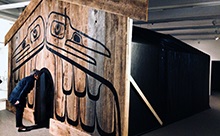 The Art Gallery of Greater Victoria welcomes Nuu-chah-nulth artists to Family Sunday; a buoyant community day with hands-on activities for learning about art, place and home.
The Art Gallery of Greater Victoria welcomes Nuu-chah-nulth artists to Family Sunday; a buoyant community day with hands-on activities for learning about art, place and home.
It is ‘Family Sunday’ at the Art Gallery of Greater Victoria. The gallery is buzzing with children, parents and seniors taking in Point of Contact - an exhibition about how artists contribute to shaping the idea of place. The exhibits feature a range of artworks focused on the traditional territories of the Nuu-chah-nulth people. There are natural fibre textiles and cedar bark basketry alongside 18th century etchings, modernist paintings, video and contemporary sculpture.
Visitors make their own art at well-stocked tables brimming with supplies throughout the building. Volunteer facilitators help people craft paper-masks, pull prints and guide children in drawing legendary creatures like lightning snakes and ravens. Adults participate or ponder art while ebullient kids in illustrated crowns scamper around the room.
“Family Sunday is truly a community event. When I think of "community" I think of people of all ages and backgrounds coming together to share time, ideas, stories and create new stories. This is a day to discover, experiment, wonder and play while exploring exhibitions and making art,” says Jennifer Van de Pol, educator at the AGGV.
These Sundays are one way the gallery reaches community. Every year, over 100,000 people visit its extensive collection to take in curated exhibitions, collaborative performances and art tours. Vibrant evening socials such as ‘Encounter’ and ‘Urbanite’ draw animated, chatty crowds. These happenings are in addition to a robust set of education programs offering art camps, workshops and partnerships with schools. The New Extreme Mentor program empowers youth to find their voice and create. Community conversations weave regional issues such as water-use and reconciliation into art appreciation.
Family Sunday brings special guests like musicians, visual artists, dance artists and storytellers. Today Nuu-chah-nulth artist Hjalmer Wenstob stands holding a circular frame drum speaking to a crowd of gallery visitors in the ornate wood-paneled foyer of the Spencer Mansion.
“When we dance we bring stories back to life through ceremony and breathe life back into masks through dancing and song,” explains Wenstob. He introduces his younger brother Timmy who is donning a wooden mask of a Kingfisher with a strong beak carved by the older Wenstob. Hjalmer sings loudly in a booming tenor and drums with steady confidence while Timmy begins high-stepping, ducking and swooping to mimic a skittish kingfisher. As the drumming and dancing quickens the crowd starts clapping and whooping.
After the dance performance, visitors pile into a traditional whaler’s Nuu-cha-nulth longhouse assembled in one of the galleries. The Wenstobs share a story and how to say thank you (Huy ch q’u) in Coast Salish language. "This is your home,” says Hjalmer. “If you learn the language of your home - you’ll love it even more.”
Over the past 60 years the AGGV has grown to be the second largest public gallery in the province. The Gallery is able to be responsive to what the community wants, in part, because of an annual operating grant through the CRD. “The Capital Regional District Arts Development Service supports many arts organizations in this region. Without this support the city would be a much less awesome place to live than it is,” says Gallery Director, John Tupper.
The Gallery is open every day except Monday and hosts Family Sundays every third Sunday of the month between October and June.